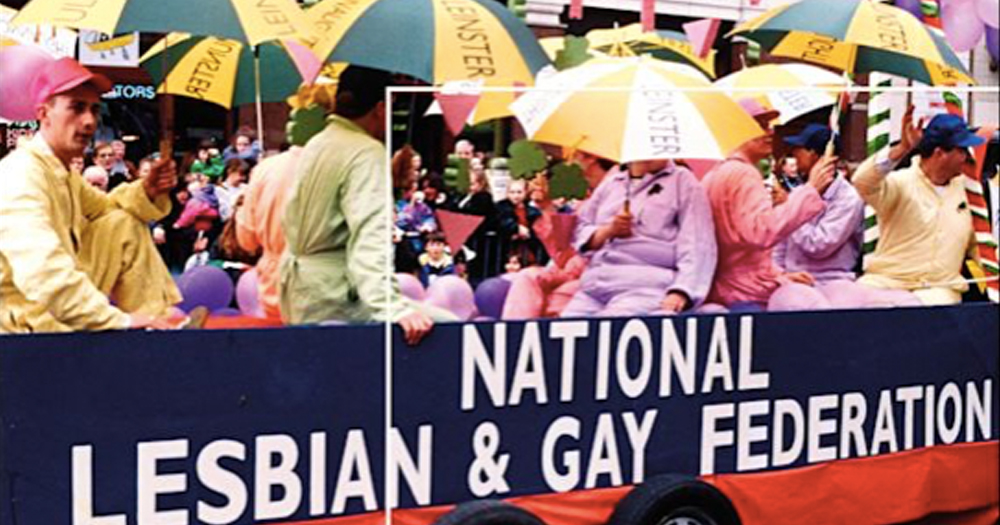The fight for LGBTQ+ rights in Ireland took many forms; from the push towards decriminalisation to the involvement of women; from activism in Cork and Galway to the impact of AIDS.
We sat down with Dr Patrick McDonagh, the author of fantastic new book on the subject to find out more.
Can you tell us a bit about the book and why it focuses on activism rather than ‘movements’?
Gay and Lesbian Activism in the Republic of Ireland 1973-93 explores the many varied activities that gay and lesbian individuals engaged in to try to improve the lives of gay and lesbian individuals in the Republic of Ireland from the start of gay rights activism here in 1973 to the decriminalisation of sexual activity between males and the amendment of the Unfair Dismissals Act to include sexual orientation in 1993.
However, rather than focusing primarily on the efforts to decriminalise sexual activity between males and restricting the analysis to the court cases, this book explores the other activities and sites of activism during this period.
In particular, it looks at the importance of gay and lesbian organisations creating spaces to meet throughout Ireland, whether that be the Hirschfeld Centre in Dublin, the Phoenix Centre or Quay Co-Op in Cork or meeting rooms in hotels in Galway. It also explores the establishment of important services such as Tel-A-Friend, Lesbian Line and Parents Enquiry, the response to HIV and AIDS in 1980’s Ireland, and interaction with the trade union movement, student movement, Irish Council for Civil Liberties, political parties and international gay and lesbian organisations.
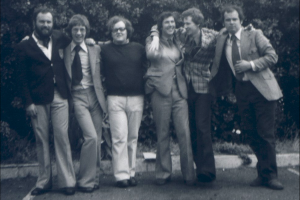
Photograph reproduced with kind permission of David Norris.
“In short, the book seeks to demonstrate the extent to which gay and lesbian activists in Ireland did not solely campaign to decriminalise sexual activity between males, but rather engaged in much broader activism, which was not confined to Dublin nor solely to the activities of men. Through these efforts, they helped to forge important alliances and bring about an improvement in the lives of gay and lesbian individuals in Ireland.
Their efforts have also contributed to the dramatic changes that have taken place in recent years in Ireland and must be acknowledged. The book seeks to emphasise the extent to which Ireland’s gay and lesbian community has played a significant role in the transformation of Irish society and further historical research should not omit their stories or contribution. This goes for the wider contribution of the LGBTQ+ community.”
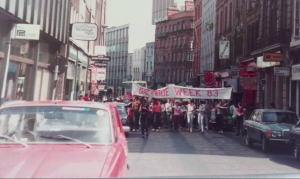
Photo courtesy of Kieran Rose
One of the crucial areas that the book covers is the role of activism in a broader national context. Can you tell us a bit more about that?
When I began this project two key priorities for me were including the role and contribution of lesbian women and the activities and efforts that took place outside of Dublin. As someone who isn’t from Dublin I was naturally interested in what might have been happening in other regions of Ireland. I also believe that so much of Irish history revolves around Dublin and what happens outside of Dublin is often considered as secondary importance.
You see this quite often with Queer History as well, where much of the focus is on the major cities and it is always assumed that nothing was happening in smaller towns or villages. This perennial image of smaller regions as being backward etc. and nothing important ever happening there still persists in the historiography.
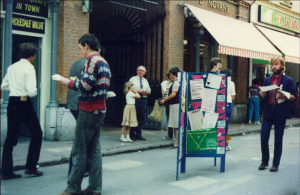
In my book I look at what individuals in Cork and Galway also got up to during this period and it wouldn’t be an exaggeration to say that there was quite a lot happening. Cork, in many respects, was a hive of activity during this period. Numerous organisations emerged there and helped advance gay rights in Ireland. These included the Cork Irish Gay Rights Movement, Cork Gay Collective and Cork Lesbian Group.
The Cork Lesbian Group provided an important outlet for lesbian women in Cork and Munster to meet and socialise and were centrally involved in the organisation of the Cork Women’s Fun Weekend and establishment of the Cork Lesbian Line in 1985, while the Cork Irish Gay Rights Movement created the first gay centre in Cork, known as the Phoenix Centre which ran the Gay Switchboard, discos and other activities for the community in Cork and Munster.
A highlight of the Cork IGRM’s activities was the organisation of the first Gay Pride events in 1981 with the Cork Gay Collective, which included the erection of a pink triangle at the top of the Comeragh Mountains. The Cork Gay Collective, although a relatively small group, worked tirelessly and successfully to get the trade union movement behind gay rights, while also taking the lead in responding to the emerging HIV and AIDS crisis in Ireland. It was the Cork Gay Collective that organised the first National Gay Conference in Ireland, which took place in May 1981.
In Galway, while the efforts there did not reach the same heights as they did in Cork and Dublin, were nevertheless important for individuals based in Galway and in the surrounding regions. As early as 1980, a group known as the Galway Gay Collective was established by Marese Walsh and John Porter. For much of the early to mid-1980’s Walsh and Porter worked to create a space for individuals in Galway to meet, often organising meetings in hotels where gay and lesbian individuals could meet without having to ‘out’ themselves.
The Galway Gay Collective promoted their existence through the local press and individuals were able to contact them. During a period and in a location where there were very few opportunities for gay and lesbian individuals to meet others, the existence of the Galway Gay Collective was a lifeline for many.
“These stories are often overlooked but these activities were important in creating spaces for gay and lesbian individuals to meet others, to become more confident and accepting in their sexuality and in doing so undermining the status quo in Ireland.”
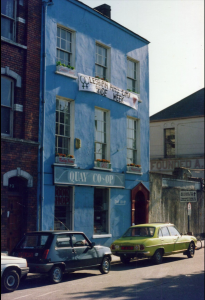
We hear a lot about Gay rights in the push towards decriminalisation. Can you expand on the role that lesbian activism played and how lesbian rights were impacted?
You certainly cannot write the history of gay rights activism in the Republic of Ireland without including the role of lesbian women. From the very start of gay rights activism in Ireland in the early 1970’s, lesbian women were there challenging the homophobia and sexism that permeated Irish society. Unfortunately, due to the overwhelming focus on the efforts to decriminalise sexual activity between males, until recently, the contribution of lesbian women had been overlooked or ignored.
And while it is often stated that sexual activity between women was never criminalised in Ireland, this does not mean that they were accepted in Irish society, quite the opposite. For much of twentieth century Ireland, there was little understanding or awareness of lesbians, with many women growing up not knowing how to describe their emotions and feelings, contributing to considerable isolation, loneliness and fear. Like with sexuality more generally, these topics were just not to be talked about and this was particularly the case for homosexuality.
Lesbian women faced many issues due to the stigma associated with their sexuality, whether that be in terms of employment, motherhood, healthcare, education, amongst others. In 1987, for example, the Sunday Independent reported that a woman had been sacked from her job in the Public Service after her superiors discovered she was a lesbian.
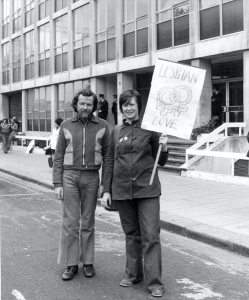
So when the Irish Gay Rights Movement was set up in 1974, the few women who got involved with the organisation worked tirelessly to create a space for women within the organisation where they could meet others and to talk about their sexuality. The same happened in other regions in Ireland, most notably in Cork with the Cork Lesbian Group or Galway with the Galway Gay Collective. They established services and supports for women, but also took to the media to create greater awareness and understanding, while also lobbying others to support gay rights. One of the bravest individuals I think from this period was Joni Crone who did tremendous work for the lesbian community in Ireland, even appearing on The Late Late Show in 1980 to discuss her sexuality.
We shouldn’t forget also the role lesbian women played in the efforts to decriminalise sexual activity between males. One clear example of this can be seen in the recommendations that came out of the Second Commission on the Status of Women in January 1993. The Commission received submissions from organisations such as the Lesbian Support Group, Cork Lesbian Line and Lesbian Line Dublin. In their recommendations to the government, the Commission recommended the decriminalisation of sexual activity between males and the inclusion of sexual orientation in the Unfair Dismissals Act.
“So throughout Ireland many lesbian women refused to succumb to the homophobia and hostility in Ireland and instead challenged the attitudes and fought to make Irish society more inclusive.”
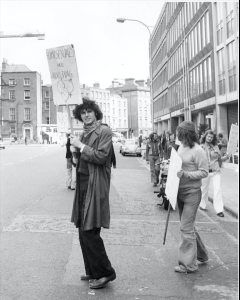
Can you explain how you feel the AIDS Epidemic changed the face of LGBTQ+ rights activism in Ireland specifically?
Like many other countries, it was the gay community who were first to respond to the emerging HIV and AIDS crisis in Ireland. In Ireland, like elsewhere, the gay community had to deal with early media reports that sensationalised HIV and AIDS, describing it as the ‘gay plague’, ‘gay cancer’, or ‘gay disease’. At a time when there was limited information, this only added to the already difficult climate many gay and lesbian individuals faced in Ireland.
Subsequent Irish governments were negligent in their response to HIV and AIDS, deciding to take a moralistic attitude towards combating HIV and AIDS, advising against any form of sexual activity outside of marriage, very much in keeping with the messaging of the Roman Catholic Church. In 1985, the then government even explored the possibility of using AIDS as a defence in the Norris case, ultimately deciding against such a defence after they were informed that the laws were more likely to hinder efforts to combat HIV and AIDS than help. Despite this, it would be another eight years before the government amended the laws.
“There can be no doubt that there was considerable concern within the Irish gay community about HIV and AIDS. However, unlike the government, Irish gay and lesbian activists took a proactive approach to combatting HIV and AIDS. They recognised that accurate, but particularly, explicit information was crucial to help prevent the spread of HIV and AIDS. It was to this that a small cohort of gay and lesbian individuals turned their attention in the mid-1980’s with the establishment of Gay Health Action.
Throughout the 1980’s, Gay Health Action worked tirelessly to provide explicit information to not only the gay community, but wider Irish society in the absence of such information in government campaigns. GHA produced the first AIDS Information Leaflet and Booklets, along with other important public educational material. They also established Cairde, a support group for individuals who were HIV Positive. As a result, many organisations turned to GHA for information and support as they developed a reputation as the experts on HIV and AIDS in Ireland.
There can be no doubt that this work took its toll on those involved. Without state funding, it was to the gay community that GHA relied on for funds, often organising fundraisers at gay venues. What’s quite remarkable and again a testament to the resilience of many gay and lesbian individuals is the extent to which they continued with the efforts to decriminalise sexual activity between males, continued to run the switchboards, continued to run the discos, continued to challenge the homophobia, continued to lobby the trade union movement, the political parties, and continued to support the wider gay community, while at the same time leading efforts to provide much needed information and services on HIV and AIDS. It’s impossible to comprehend how they were able to do all this, all of which was done voluntarily.
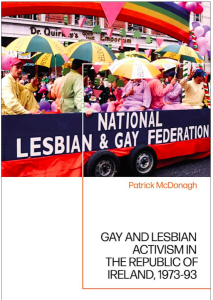
Had it not been for the efforts of the gay community, one can only imagine how much worse the situation could have been in Ireland. GHA, through its actions, saved many lives and helped those most affected by HIV and AIDS. In doing so, it led to many sectors of Irish society commending their efforts and increased calls for decriminalisation and support for the gay community. In many respects, the high-profile members of Gay Health Action developed through many media appearances helped to raise the wider profile of the gay community and gay rights.
Despite their contribution to these efforts, however, there has been little recognition in history books or by the state for what the gay community did during a very challenging period. As one Senator speaking about the response of the gay community to HIV and AIDS said at the time, ‘the heterosexual community owe a debt to the homosexual community’. I’m still not convinced that there is an appreciation of what the gay community did during this period.
Like with so much of Irish Queer History we still have so much to uncover and recover and the impact of HIV and AIDS has still to be fully explored, but what I hope I have done with this book is demonstrate the considerable efforts of the gay community in responding to HIV and AIDS and the leadership they showed in doing so. We all owe them a huge debt of gratitude.”
Gay and Lesbian Activism in the Republic of Ireland 1973-93 is available to purchase online here. To find out more or to avail of a discount email [email protected] or contact the author directly at [email protected]
© 2022 GCN (Gay Community News). All rights reserved.
Support GCN
GCN is a free, vital resource for Ireland’s LGBTQ+ community since 1988.
GCN is a trading name of National LGBT Federation CLG, a registered charity - Charity Number: 20034580.
GCN relies on the generous support of the community and allies to sustain the crucial work that we do. Producing GCN is costly, and, in an industry which has been hugely impacted by rising costs, we need your support to help sustain and grow this vital resource.
Supporting GCN for as little as €1.99 per month will help us continue our work as Ireland’s free, independent LGBTQ+ media.
